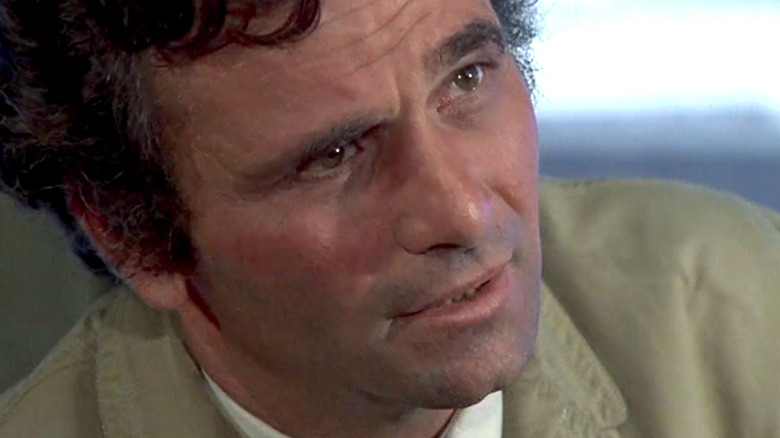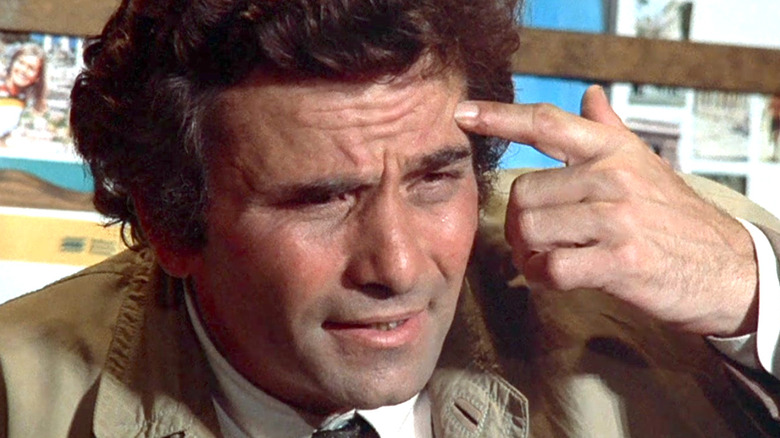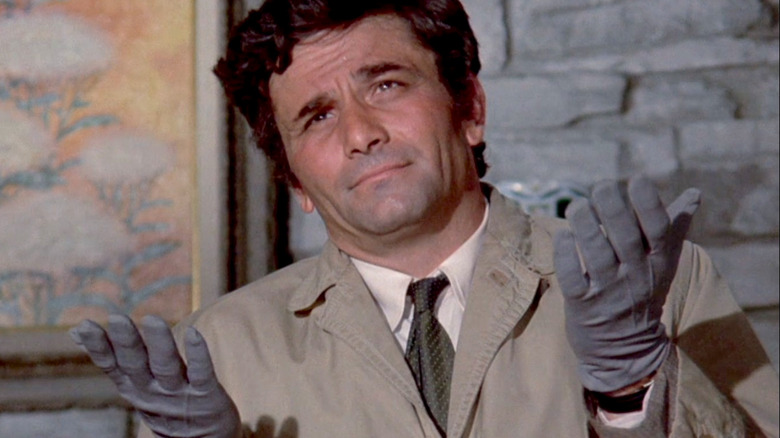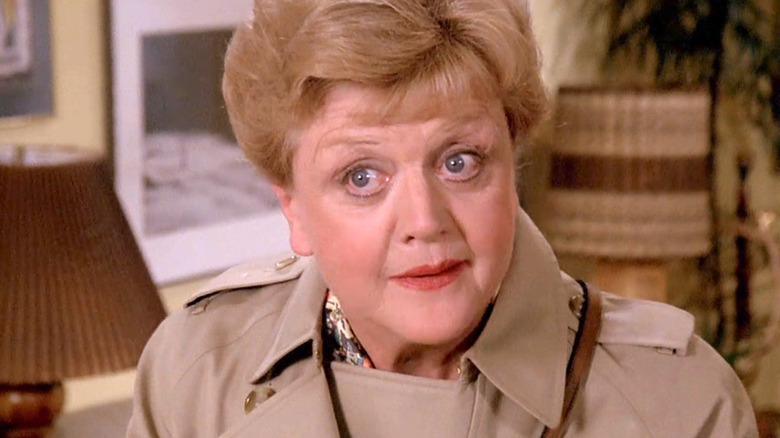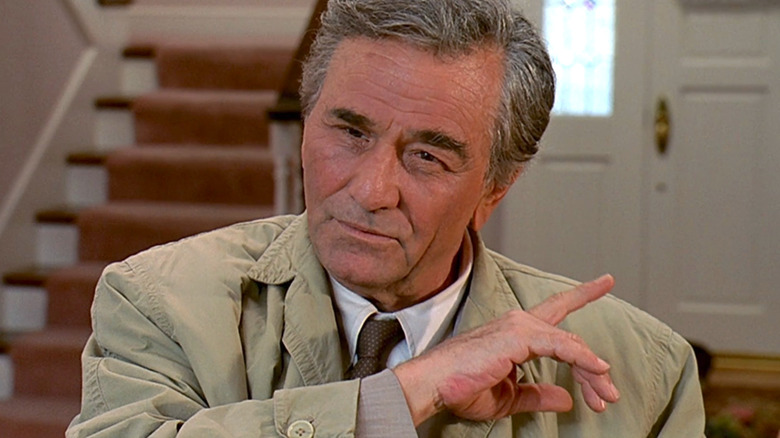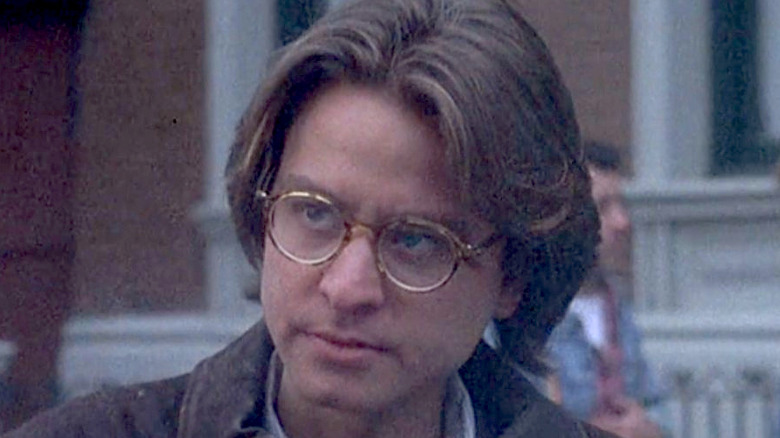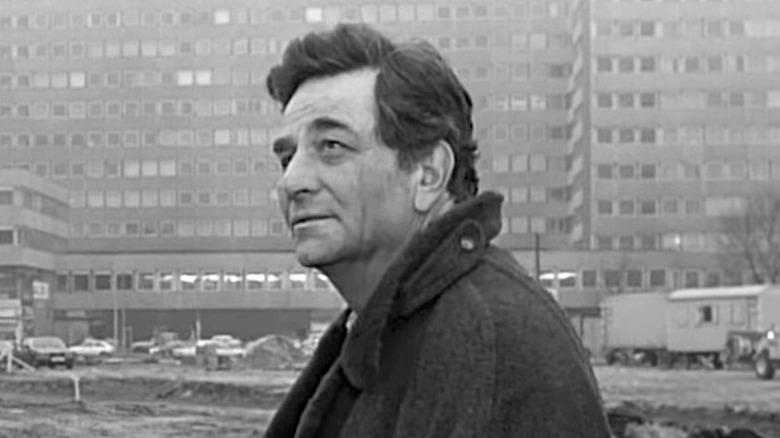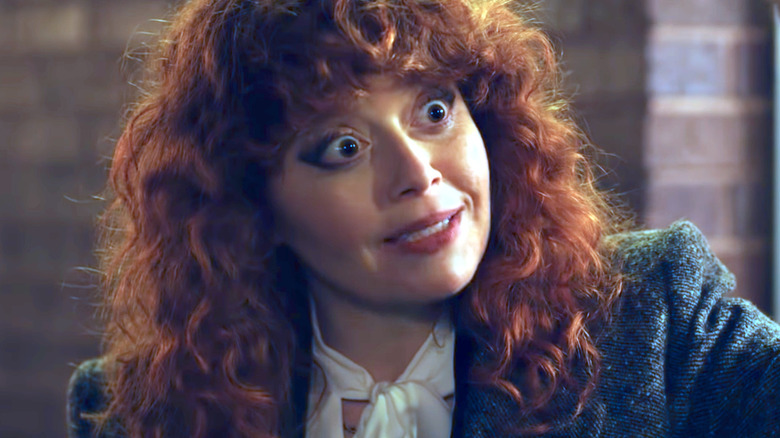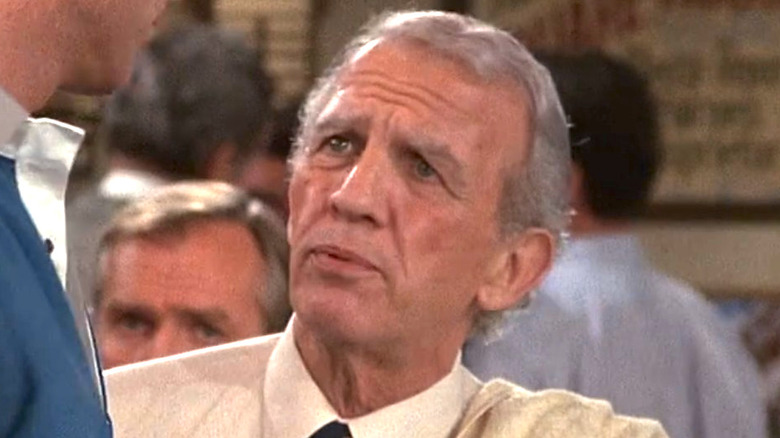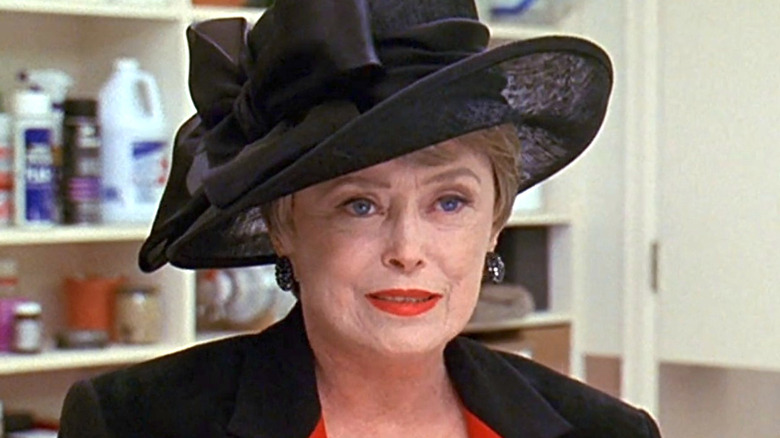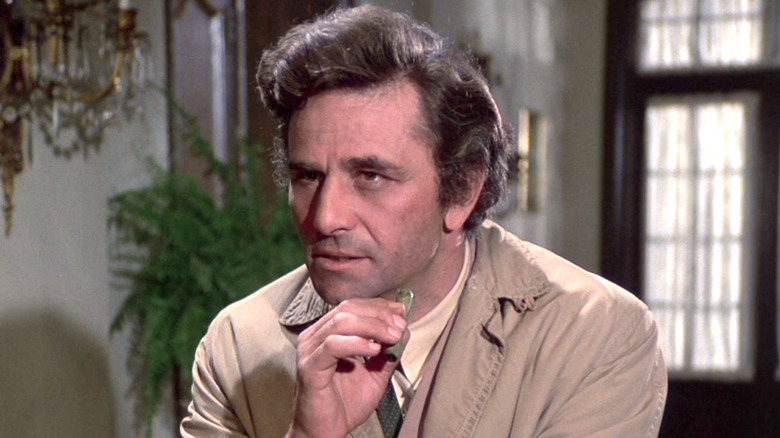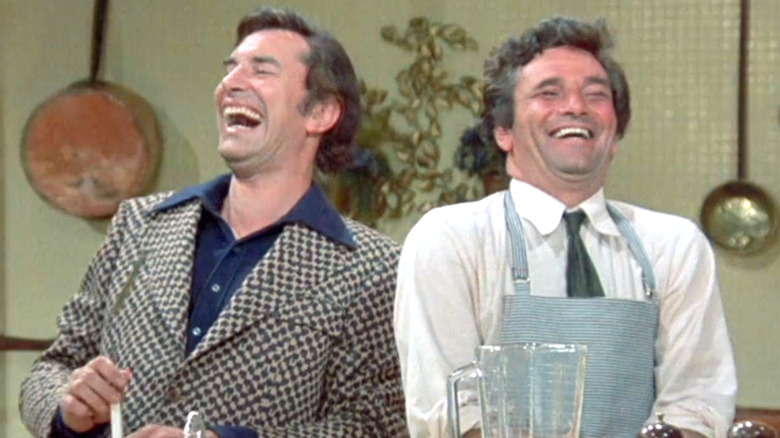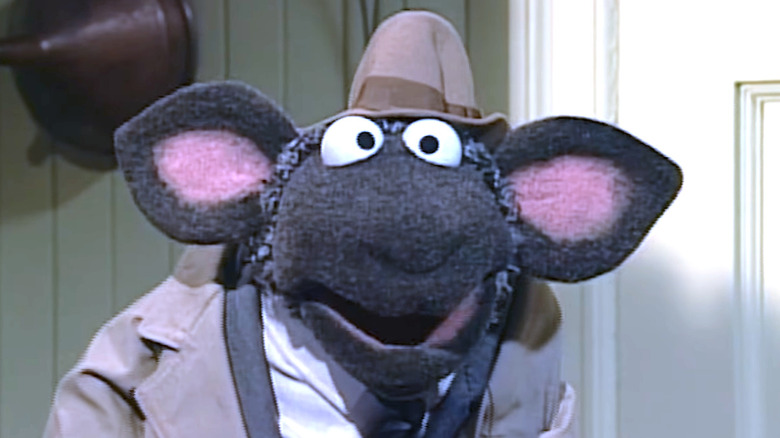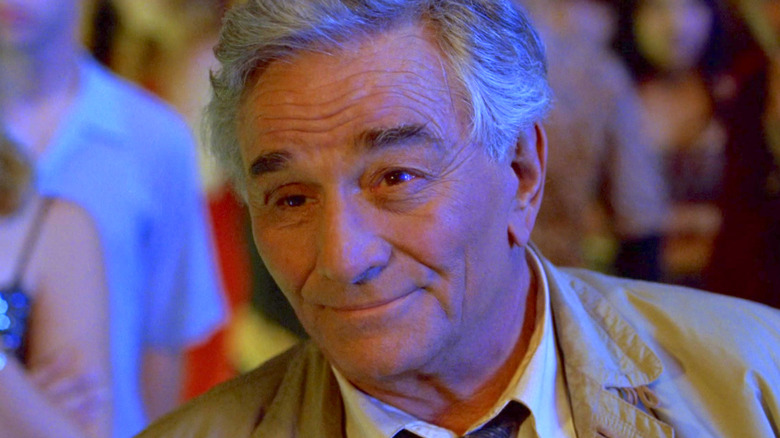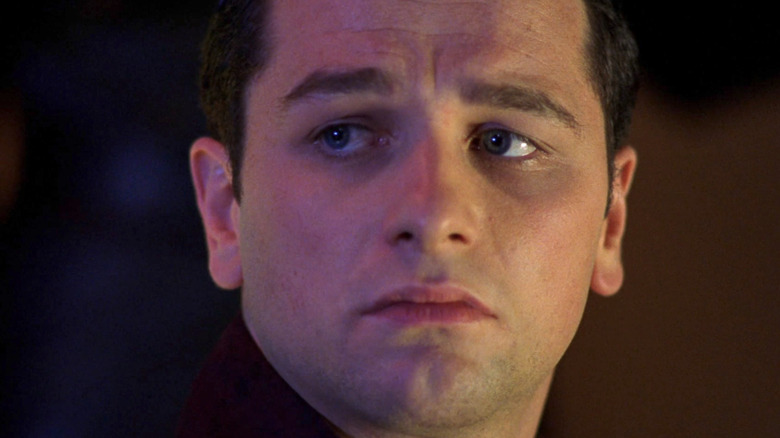The Untold Truth Of Columbo
People have been watching the mystery show "Columbo" for over 50 years. Polite, tenacious, and in desperate need of a comb, the titular detective is a blue-collar guy who only ever dresses in shades of brown. Peter Falk played the role for the show's entire run, perfectly embodying the rumpled everyman who first started asking bad guys "just one more thing" in 1968. Ever since then, people have fallen in love with the disheveled detective who never rests until he gets his target. In brief, Columbo is one of the greatest detectives in TV history, on one of the best mystery shows of all time.
Maybe you watched the show back when TVs still had dials. Maybe you binged it more recently on a tablet. Maybe you haven't seen an episode yourself yet, but have been called "Columbo" by loved ones when you're the one who remembers where to look for the Wi-Fi password. Whoever you are, you know this unkempt, clue-spotting king. But how well? Pour yourself a cup of coffee, tilt your head to one side, and join us to discover the untold truth of "Columbo."
Columbo's fate was never certain
Studio meddling, Peter Falk's perfectionism, and battles over budget kept the fate of "Columbo" uncertain for the show's entire run. Network executives had many notes for the show, even when it proved to be a hit in the early days. A list of collected network concerns published in Mark Dawidziak's "The Columbo Phile" reads as follows: "What's all this about the audience always knowing who the murderer is? There's no suspense. That novelty will wear off. Get the main character on earlier. There's too much talk." Peter Falk also took a heavy interest in the writing process, much to the writers' chagrin.
While creators William Link and Richard Levinson liked Falk, they didn't want to have to go to him for script approval. At the same time, Falk didn't want anyone to compromise the quality of the show or his character, and he wanted to direct. He made a deal with the network to direct an episode of "Columbo" Season 1, but the offer was later canceled later. Falk walked off set, earning himself a suspension and a reputation for being "difficult" (per "The Columbo Phile").
Between the executives disliking the show's format, the writers resenting the long episodes, and Falk demanding extensive script access, there was plenty of tension on the "Columbo" set, and years would pass between Falk's contracts. During one such break, a producer suggested they only use Falk as Columbo part-time and have less "difficult" actors guest star (per "The Columbo Phile").
Execs tried to replace Columbo
"Columbo" was never canceled outright, but contracts for new seasons often took years to draw up. During one such lull in production in the late 1970s, executives saw their chance to replace the notoriously "difficult" Falk. David Koenig details this misguided exercise in his book "Shooting Columbo: The Lives and Deaths of TV's Rumpled Detective." Fred Silverman, an executive known at the time for attracting the ever-elusive "young" audience with hip programming like "Charlie's Angels," suggested making a spin-off series, "Mrs. Columbo," which would follow the detective's wife. As Koenig writes, "The character was never seen on 'Columbo' so they could make her anything they wanted, conforming her to contemporary tastes. And that way, NBC could retain the 'Columbo' audience without having to endure the hardship of working with Falk."
Levinson, Link, and writer Peter S. Fischer were brought in to consult. Fischer wrote a script featuring Mrs. Columbo as a warm 40-something woman who spends her time solving mysteries. However, Silverman wound up casting a 23-year-old Kate Mulgrew for the part instead. In an interview featured in Mark Dawidziak's "The Columbo Phile," Falk called it "disgraceful." Audiences apparently agreed, as the show failed to perform and ended in 1980. Eventually, Falk returned to his role, and the original "Columbo" rode again.
Columbo and Murder, She Wrote share a legacy
Ever wonder how "Murder, She Wrote" protagonist Jessica Fletcher would fare in Columbo's crime-ridden Los Angeles? Ever lost any sleep pondering how Columbo would comport himself on the mean streets of Cabot Cove? Next time you marathon the best episodes of "Columbo," follow it up with the best episodes of "Murder, She Wrote." Though these shows might not look related at first squint, they share DNA, and not just in their protagonists' lookalike raincoats.
Writers William Link and Richard Levinson co-created both "Columbo" and "Murder, She Wrote." The latter show added a third creator in Peter S. Fischer, who'd previously written several episodes of "Columbo." "Publish or Perish," one of Fischer's "Columbo" scripts, even takes place in the devious world of publishing and features "Columbo" All-Star Jack Cassidy as the villain. While Jessica Fletcher's world is a touch cozier than Columbo's, we wouldn't mind seeing how she would have handled Cassidy's sleazy publisher Riley Greenleaf.
Of course, "Columbo" has many other famous writers up its raincoat sleeve as well, including Steven Bochco, who later developed series like "Hill Street Blues," "L.A. Law," "NYPD Blue," and "Doogie Howser, M.D."
Laziness is to thank for just one more thing
"Columbo" started its life on the stage. Levinson and Link originally wrote "Prescription: Murder" — the show's first pilot episode — as a stage play in 1962. That version of the story also gave birth to the detective's most famous catchphrase. "When Bill and I were writing the play, we had a scene that was too short, and we had already had Columbo make his exit," Levinson said in an interview featured in "The Columbo Phile." "We were too lazy to retype the scene, so we had him come back and say, 'Oh, just one more thing...'" The happy accident of "just one more thing" became the shabby detective's calling card. These "last" questions could cleverly get information out of both killers and their accomplices by wearing them down.
The Columbo line of questioning has since been adopted by motivational speakers, salespeople, and even counselors. "The value of the Columbo approach is that it forces the client, rather than the counselor, to grapple with discrepancies and attempt to resolve them," Cheryl Grills, Ph.D. writes in a contribution for the National Library of Medicine. "This approach reinforces the notion that the client is the expert on his or her behavior and values." Not too shabby for a line that was originally written out of laziness.
The Spielberg connection
Ever heard of Steven Spielberg? One of the famous filmmaker's first directing jobs came on "Columbo" Season 1, Episode 1, "Murder By the Book." It was 1971, and Spielberg was still fresh out of Cal State Long Beach, ready to make a little thing called "movie magic." He clearly made an impression with his "Columbo" episode, but his connection to the show didn't stop there.
Later, when Peter Falk was directing the episode "Blueprint for Murder," he called the young Spielberg for tips. The director even joined Falk on set one day to help him out (per "The Columbo Phile"). The two men clearly shared a dedication to their creative visions. When Falk wanted 25 extras for a shot and the studio would only pay for 8, Falk paid for the remaining 17 out of his own pocket (per "Shooting Columbo" by David Koenig).
Spielberg hoped to direct another episode of "Columbo," but the timing didn't work out. However, the creative team didn't seem to forget their old friend. The 1989 episode "Murder, Smoke and Shadows" stars Fisher Stevens as a director who's strikingly similar to Spielberg, apart from his villainous criminal activity. The episode is a delightful send-up of Spielberg and features both scenes on the "Jaws" ride and a murder on a backlot, complete with a killer rain machine.
Peter Falk was an angel
Weeks into production on his 1987 film "Wings of desire," German filmmaker Wim Wenders needed a miracle. The movie tells the poetic and powerful story of an angel who falls in love with a human, and Wenders realized late in the process that he was missing a key character (per People). He needed someone to play an ex-angel who could guide the main character, and he needed a universally beloved actor to play the part of the angel-turned-human. Ultimately, Wenders decided that he needed Peter Falk.
The director contacted the "Columbo" star immediately, who was romanced by the lack of script and the fantastical nature of the film. Days later, Falk wandered through the streets of West Berlin, improvising the touching and sweetly funny role of his fictionalized self — former angel and forever friend to mankind. This fictitious Falk is recognized by some locals in the film, who wonder aloud if he might be Columbo but decide he couldn't be. No movie star would wear such a shabby coat, after all.
Falk's international fame wasn't just applied to art-house films. In the late 1980s, he claimed that the government of Romania asked him to reassure the Romanian people that the reason new "Columbo" episodes weren't airing was due to production delays — not because they were being tactically withheld by the government (per AV Club).
Natasha Lyonne wants to bring Columbo back
Fans on the internet have occasionally insisted that Mark Ruffalo would be the perfect star for a "Columbo" revival. When the MCU star isn't hulking out, he's certainly got the rumpled detective look down. But if Columbo has taught us anything, it's that looks can be deceiving.
Natasha Lyonne, star of the modern twisty-mystery "Russian Doll," has stepped up to the plate herself, jokingly offering to fight Ruffalo in 2020 for the honors of donning Columbo's rumpled raincoat. Now, Lyonne and director Rian Johnson are working together to make their version of a "Columbo" reboot a reality. "Poker Face," the TV project from Lyonne and Johnson, is billed as a character-driven, mystery-of-the-week show. Johnson is a confirmed "Columbo" fan, and he's confirmed that the show inspired aspects of "Knives Out" (per Collider). "Columbo" also gets quite a few references in "Russian Doll" Season 2. While Lyonne may not be Columbo in name yet, she at least still gets to star in her own off-brand version of the classic series.
Coach from Cheers convinced Columbo to get a dog
Nick Colasanto, famous for portraying "Coach" Ernie Pantusso as one of the actors on "Cheers," was also a renowned television director. He directed two major "Columbo" episodes and made a significant additional contribution to the Columboverse by talking Peter Falk into Dog. Yes, Dog. Not just a dog, but the dog — the dog named Dog.
Co-creators Levinson and Link were under constant pressure to make Columbo appealing to the "young and hip" audience. When told to give Columbo a young sidekick, Levinson said "Let's give him a dog" as a "contemptuous swipe at the network" (per "The Columbo Phile"). Falk resisted, not wanting Columbo to be loaded with another gimmick. "Nick Colasanto loved the idea," Falk said, speaking to Mark Dawidziak for "The Columbo Phile." "Nick said, 'Can I show you the dog?' I said, 'Well, if you want to, Nick, but I tell you, I'm against it.' Then he brought in the dog. I said, 'You're right. That's Columbo's dog.' There was no name you could give his hound -– just Dog."
Dog was introduced in "Étude in Black," directed by Colasanto, and stayed on for the rest of the show's run. Colasanto also directed "Swan Song," starring Johnny Cash as a killer crooner. Clearly, the director was as good with big personalities as he was with small dogs.
Prescription: Guest Stars
Rue McClanahan, Vincent Price, Martin Sheen, Ian McShane, Jamie Lee Curtis, Little Richard, Kim Cattrall, Katey Sagal, Leslie Nielsen, Roscoe Lee Browne, and Julie Newmar are just a few of the famous faces to guest-star on "Columbo" — and none of them even played killers. Over the course of its run, "Columbo" saw a huge rotation of A-list guest stars, adding a level of cinematic pedigree to the show.
Rue McClanahan, famous for her portrayal of Blanche on "Golden Girls," plays a doomed Hollywood gossip columnist in "Ashes to Ashes." She meets her end at the hands of a glamorous Hollywood funeral director played by Patrick McGoohan, who made his name in "The Prisoner." McGoohan appreciated Falk's dedication to his own show. "Peter fought every inch of the way for quality," McGoohan told Dawidziak in "The Columbo Phile." In turn, Falk trusted McGoohan as a scene partner, and director, even asking him to rewrite entire "Columbo" scripts. As Falk later told AARP, "All of us are eternally indebted to Pat McGoohan...He's a wonderful writer. A genius. And a great, great Columbo villain!"
This kind of trust and collaboration among so many talented people is a huge part of why "Columbo" remained so successful for so long.
Peter Falk designed Columbo's costume
One of Lt. Columbo's most iconic features is his perfectly drab raincoat — a piece that apparently helped Peter Falk design the rest of the character's costume. In his memoir "Just One More Thing," Falk recounts, "I asked a wardrobe person to take one of the suits...and dye it a drab brown. I wanted it to match my raincoat...then I added a drab green tie that I had had for a thousand years." Columbo's costume would never part with that green tie, either –- even after famous fashion designer Edith Head selected a new tie when she guest-starred on the show.
The look never wavered. Even the tired old Peugeot Falk chose from the studio backlot remained Columbo's mode of transport for 35 years. Falk told "The Columbo Phile," "It was the day before we were to start shooting, and they wanted me to pick out a car. As an actor, it was like trying to find the right hat for a part. I finally told Bill, 'I don't see anything. Let's go.' Just as we were walking out, way back in a corner, I just saw the nose of a car sticking out. They said, 'This one doesn't even run. It doesn't even have an engine in it.' I said, 'This is the one.'" Clearly, it wound up being the perfect choice for the show's titular detective.
Peter Falk loved to improvise
Peter Falk loved keeping himself and his fellow actors fresh on set, especially through improvisation. "We had a set that was very receptive to ideas," Falk said in an interview for "The Columbo Phile." He often utilized small improvisations, like asking a scene partner for a piece of paper or a pencil, just to keep things from getting stale. Other times, entire scenes were improvised, like the Martin Landau cooking show segment in "Double Shock" (per "The Columbo Phile"). Falk's improvisations also led to him accidentally creating Columbo's unofficial theme song, "This Old Man." The tune became a bit of a trademark for his character and eventually got its own orchestral arrangement in the show.
"Why did it catch on?" Falk asks in his memoir, "Just One More Thing." "I don't have a fancy answer. It appealed to millions of viewers for the same reason it appealed to me — it's delicious, catchy, and fun. It's appropriate because Columbo should have a favorite tune that's distinctive – that's peculiar to one man and, like the car and the raincoat, separates him from the herd."
Tie-ins to die for
"Sesame Street" started making "Colambo" sketches of a shambling sheep solving nursery rhymes back in the 1990s. Decades later, a quick search on Etsy will return more "Columbo" themed arts and crafts than you can shake a cigar at. But official "Columbo" merchandise has always been harder to find than non-circumstantial evidence. One board game was released by Milton Bradley in the 1970s, albeit with illustrations that looked more like Tom Selleck than Peter Falk.
A handful of official episode novelizations were released, but these have nothing on the book-only killers cooked up for Columbo to catch, like Charles Manson in "Columbo: The Helter Skelter Murders" and whoever really killed JFK in "Columbo: The Grassy Knoll." If you're not still trying to wrap your head around Columbo eating a hard-boiled egg in San Quentin, might we interest you in "Columbo: The Hoffa Connection?" This title sees Columbo searching for the link between the death of a Madonna-esque superstar and Teamsters president Jimmy Hoffa, who disappeared 20 years before her death.
"Cooking With Columbo: Suppers with The Shambling Sleuth" by Jenny Hammerton is a more recent entry in the "Columbo" merch game. It includes humorous episode recaps and recipes from Columbo's co-stars. Aside from hard-boiled eggs and coffee, Columbo's favorite meal is chili. The book boasts four recipes for it, including one by Johnny Cash – Squirrel meat optional.
Peter Falk never got to solve Columbo's last case
You'd think that if Peter Falk had wanted to shoot a farewell "Columbo" episode, studios would have greenlit the project faster than you could say "just one more thing." Unfortunately, that wasn't the case when it came to "Columbo's Last Case." The elder Falk wanted a chance at a goodbye episode, and he revised the script for "Columbo's Last Case" himself. He and William Link, the co-creator of the character, lobbied the networks for funds but were told no. Networks wanted to appeal to a younger audience (per "The Columbo Phile"). How could they do that with a white-haired detective?
Charles Engel, then executive vice president of programming at NBC Universal, discussed the unfilmed finale for "The Columbo Phile." "Peter is going to be 80 and nobody seems to want a leading man who is 80" he said. Link added, "Ageism is rampant in Hollywood, at all levels, but this might be more than ageism. The detective shows on the broadcast networks are all police procedurals dominated by endless discussions of forensic evidence. 'Columbo" was a classy, clever, witty show that challenged you to use your mind."
Whether networks passed on a farewell "Columbo" episode due to ageism or lack of taste, one thing is certain: "Columbo" is one of the most rewatchable TV series of all time. The show consistently held appeal for viewers regardless of Falk's age or hair color.
Peter Falk roasted Matthew Rhys' accent
Columbo's last villain was played by Matthew Rhys, a Welsh actor known for his work on "The Americans" and "Brothers & Sisters." When Rhys was cast in "Columbo Loves the Nightlife" as a tracksuit-wearing nightclub owner, he was asked to prepare an accent –- one that Falk didn't exactly approve of.
Matthew Rhys told GQ, "We're rehearsing for a few minutes and I'm giving my best London Cockney that I've worked on. And he went 'Where are you from?' And I said, 'Oh, I'm from a place called Cardiff in Wales.' He said, 'Why don't you play him as a guy from Cardiff in Wales.' And I was like, "Oh my God, Peter Falk just destroyed my Cockney accent."
While Rhys and Falk shared a great working relationship, Rhys still got his revenge by sneaking a selfie with Columbo's heavily guarded raincoat. While Falk never got to shoot his official "last case" episode, it's fitting that Columbo's final showdown ended up being against Rhys, who would bring another great detective new life with his portrayal of "Perry Mason."
